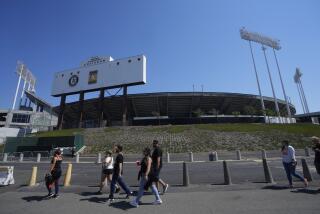New Regime in Oakland Is Counting on Beane
Arte Moreno bought the Angels for $183.5 million two springs ago, then spent an additional $145 million on four free agents, including Vladimir Guerrero, the reigning American League most valuable player.
Lew Wolff leads the investment group that bought the Oakland Athletics for $180 million this week, but the new ownership has no intention of imitating its American League West rival in Anaheim. Instead, it has invested in General Manager Billy Beane, so heavily that some of the money Beane spends now will be his own.
The A’s are expected to announce today that Beane has agreed to a contract extension through 2012 and has been granted a share of ownership, a distinction without recent precedent among major league general managers.
By the end of this season, Wolff said, he hopes to secure agreement on the site and a financing plan for a new ballpark in Oakland.
“We’re not buying the team to move it,” Wolff said.
Wolff, 69, a prominent Los Angeles real estate investor and developer whose companies focus on luxury hotels, is the A’s new managing partner. The majority investor is John Fisher, son of Gap founder Donald Fisher. Forbes lists John Fisher’s net worth at $1.5 billion -- and Moreno’s at $850 million.
That the A’s now boast one of baseball’s wealthiest ownership groups apparently will have little impact on their moderate payroll, at least until a new ballpark can bring in the bucks. Under Beane, the A’s have made four playoff appearances in the last five years, winning more games in that span than any team except the New York Yankees.
“Do we pay $100 million for a player or do we extend Billy’s contract?” Wolff said. “We think, if the past is prologue, we’re very comfortable. We think we’ve made the right decision in getting Billy to stay with us long-term, just like you’d like to have a player finish his career with you.”
Few stars finish their careers in Oakland. The A’s signed third baseman Eric Chavez to a six-year, $66-million contract last spring, but budget-driven departures in recent years have included those of shortstop Miguel Tejada, outfielder Johnny Damon, first baseman Jason Giambi and pitchers Tim Hudson, Mark Mulder and Keith Foulke.
One Oakland fan website sells “In Beane We Trust” T-shirts, but might fans not prefer that popular players finish their careers with the team, not just the general manager?
“We’ll find out,” Wolff said. “Right now, we’re not going to bet the ballclub on any one player.
“This ownership is interested in winning -- first -- and being economically viable.”
The A’s are profitable, Wolff said, one reason they can command virtually the same purchase price as the Angels, even though they play in a smaller market, draw fewer fans and lack a baseball-only stadium. Wolff saluted club President Mike Crowley, who also will receive a contract extension, and outgoing owners Steve Schott and Ken Hofmann.
“We’re looking at this as a long-term investment, and the reason we can is because the former owners are handing over an extremely well-run operation, both on and off the field,” Wolff said. “That gives us, we think, breathing room to work on the venue and work on other activities that will increase the value of the investment without having to micromanage every aspect of the team.”
Wolff said he would like to boost the team’s annual revenue from about $100 million to about $150 million -- enough, he hopes, to where the A’s can contribute to baseball’s revenue-sharing fund instead of dipping into it. He said he planned to add a few minority investors with expertise in various ventures the A’s could explore to raise revenue, possibly including a broadcasting outlet.
The most urgent venture is the one that will determine the future home of the team. Schott and Hofmann hired Wolff as a vice president two years ago and directed him to pursue a new ballpark. Although Wolff recommended one be built in the parking lot, adjacent to the current stadium, he said he was not necessarily wedded to that site.
He is adamant, however, that he will not consider San Jose, part of the San Francisco Giants’ territory under major league rules. San Jose Mayor Ron Gonzales said last month that he planned to contact Wolff after the purchase became official and urge him to move the A’s there.
“I’ll tell him our focus is on Oakland, we’re going to honor the territorial rules, and that’s the end of it,” Wolff said.
“If we’re going to stay in the Bay Area, we’re going to try and build a new facility in the Oakland area.”
The team’s lease at the renamed McAfee Coliseum extends through 2007, with one-year options through 2010, but Wolff has declined overtures to exercise options or negotiate an extension. “One of the values we’re buying is the flexibility of the lease,” he said.
Commissioner Bud Selig said he had no trouble with Wolff’s wanting a deal done by season’s end -- “They’ve had enough conversations,” Selig said -- but added that Wolff should not look elsewhere.
“I want him to concentrate on getting something done in Oakland,” Selig said.
Although Las Vegas and Portland, Ore., could offer alternatives, several high-ranking baseball officials are not enthusiastic about either site.
Wolff said he could limit a ballpark to 35,000 seats, to minimize construction costs and maximize demand for tickets. He said the A’s could not afford all of what is estimated to be a $400-million bill but would pay 25% and would consider involvement in real estate development -- surrounding the park and elsewhere in Oakland -- that could help the city and county recoup investment costs.
More to Read
Go beyond the scoreboard
Get the latest on L.A.'s teams in the daily Sports Report newsletter.
You may occasionally receive promotional content from the Los Angeles Times.







